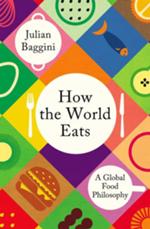How we live is shaped by how we eat. You can see this in the vastly different approaches to growing, preparing and eating food around the world, from the hunter gatherer Hadza in Tanzania whose traditionally sustainable lifestyle is being squeezed by a crowded planet & the subsistence rice farmers of Bhutan who toil without machinery to feed themselves from their smallholdings, to Western societies whose food is mostly farmed or bred in vast intensive enterprises. But while traditional approaches to providing food are often more in harmony with the natural environment, they cannot provide for a human population increasing to an historic peak. Most of us rely on a complex global food web of production, distribution, consumption & disposal, which is now contending with unprecedented challenges. We face both hunger & obesity, bumper crops & catastrophic environmental damage, food that is cheap for many & unaffordable for others. Julian Baggini expertly explores the best and worst food practices in a huge array of different societies past and present to identify the principles that can guide our future. The need for a better understanding of how we feed ourselves has never been more urgent. Wide-ranging, eye-opening and definitive, How the World Eats advocates for a pluralistic, humane, resourceful and equitable global food philosophy, with food firmly at its centre, so we can build a food system fit for the twenty-first century and beyond.

How the world eats : a global food philosophy
ISBN: 9781803510941
Format: Paperback
Publisher: Granta (UBD)
Origin: GB
Release Date: October, 2024


